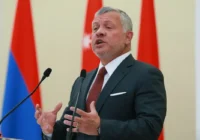The US can work with Iran to defeat the Islamic State, or it can isolate Iran and risk provoking conflict on two fronts.
Once more into the breach, dear friends, once more — and with that, we will yet again authorize war in Mesopotamia. There is no doubt that the Authorization for the Use of Military Force (AUMF) to wage war against the Islamic State (IS) will pass Congress.
According to a recent CNN/ORC poll, 78% of all Americans support the use of military force, which should come as no surprise. We are, after all, heavily invested in the idea of war, especially in places where we fail to grasp the underlying causes of conflict, like Iraq and Syria. The crowdsourced Twitter campaign from the Department of State, seeking solutions to fight terrorism, probably confirms this.
Waging war against IS, however, is a Faustian bargain and one that will inevitably challenge some, if not all, of our more established foreign policy positions on the Middle East.
Put into the simplest of terms, to defeat the Islamic State, we must work together with our old nemesis: Iran. We have reached a point where pragmatic results must outweigh ideological beliefs and decisions must conform along strategic lines regardless of how distasteful. Our foreign policy must remain flexible enough to adjust to the complexity of these rapidly changing events. Failing to do so is part of the reason we are now in this geopolitical mess.
We must either be committed to the defeat of the Islamic State or committed to the idea of isolating Iran — we can no longer have it both ways. This would only open the potential for conflict on two fronts, neither of which would be winnable for all the reasons that came to define the Iraq War between 2003-11.
And as we move closer to formally authorizing war, a more robust appreciation for how the various international actors have come together should become a point of public knowledge. The context of which should start here: Without the intervention of Iran in the days immediately following the IS assault on Mosul in June 2014, the Iraqi government would most likely have collapsed. (I say this with a degree of certainty, since I was in Baghdad watching these events unfold.)
It is also worth mentioning that we did not commit to any military endeavors until the Kurdish capital of Erbil came under threat in August 2014. Almost a full two months after the commencement of hostilities; by this time, the battlefield had already been partly shaped by the Iranian intervention. While it is easy for our politicians and media to ignore this contribution, for the people of Iraq, it remains the most legitimized form of international assistance. One that took control of the situation when Iraqi security forces were on the verge of collapse — without which, the Islamic State would still be expanding in a vacuum of disorganized resistance.
These are important facts to remember, as we once again look to engage militarily in a region whose nuance and ambiguity constantly escapes us.
Whatever the official party line might be, there is already some level of coordination with the Iranians in Iraq. The ongoing security operations are too delineated to suggest anything to the contrary. Airstrikes supporting militias aligned with Iran all but confirm this, as does the lack of condemnation for alleged Shiite crimes against Sunni civilians — the most recent being the murder of 60 residents in Diyala Province on January 26.
This reversal of longstanding policy is indeed controversial, but also necessary as the Islamic State evolves in unpredictable ways. A great deal of commentary has been given on the recent successes of the aerial campaign in halting the expansion of IS. While this is mostly correct, it also delivers a false narrative that is driven by domestic politics and the need to reaffirm public opinion. This not only limits our range of military options, but it inflates the sense of what we might actually be able to achieve without the single greatest influencer in Iraq: Iran.
Unfortunately, no group has yet proven capable enough of taking on the Islamic State in areas where it is heavily entrenched, without some form of international assistance. And to date, the most successful military operations have been collaborative efforts coordinated by Iran, which have brought together the Iraqi army and Peshmerga, with support from Shiite militias.
Attempting to undermine this cooperation due to longstanding political positions will not only put our troops in greater danger, but provide greater opportunities for the Islamic State to exploit.
So now that a spring offensive has been announced by the Pentagon to retake Mosul, we are facing a sizable conundrum: How do we work with Iran?
The Iranians will be involved one way or another, either with us or against us. This is why talks of new sanctions are entirely counterproductive, as are amendments to the AUMF that provide authority to strike Iran. It only reinforces just how little our legislators actually understand the war they are going to authorize.
Alternatively, one of the very few positive outcomes since the rise of the Islamic State has been the modest sense of rapprochement with Iran. This alleviation of tensions will, in all likelihood, lead to a nuclear agreement certified by the P5+1 group of the United States, Russia, China, Britain, France and Germany, which is a positive development for the Middle East — one of the very few.
Unfortunately, this detente will have long-term consequences. We cannot defeat the Islamic State without the political and military acumen of Iran, and this will become our Faustian bargain. By even acknowledging Iranian participation, we will be enfranchising regimes in Baghdad and Damascus and furthering the conditions that have empowered sectarian conflict. Especially since proxy groups, including the Shiite militias in Iraq, and Hezbollah are becoming more involved in the fight against the Islamic State. This only reinforces the narrative that IS uses to justify its war and compel recruitment, since both Iraq and Syria marginalize and repress their Sunni populations.
It will also continue to make longstanding allies in the Middle East skeptical about our commitment to their security, specifically Saudi Arabia and Israel. This is a legitimate concern, but it should never supersede our ultimate objective in authorizing war, which is to defeat the Islamic State, not pander to the foreign policy objectives of other countries.
In the weeks and months to come, as the inevitably of war becomes more official and our troops prepare for battle, we must confront each of these bad to worst case scenarios. There are no clear options left, only workable solutions that will continue to stress the very foundations of our longstanding foreign policies. We can work together with Iran to defeat the Islamic State, or isolate Iran and risk provoking conflict on two fronts. Both of these options represent the grim future of the modern Middle East. The choice is now up to you.
We bring you perspectives from around the world. Help us to inform and educate. Your donation is tax-deductible. Join over 400 people to become a donor or you could choose to be a sponsor.
The views expressed in this article are the author’s own and do not necessarily reflect Fair Observer’s editorial policy.
Photo Credit: Konstantin L / Mykhaylo Palinchak / Shutterstock.com / Wiki Commons
2 comments
Leave a comment
You must be logged in to post a comment.
Support Fair Observer
We rely on your support for our independence, diversity and quality.
For more than 10 years, Fair Observer has been free, fair and independent. No billionaire owns us, no advertisers control us. We are a reader-supported nonprofit. Unlike many other publications, we keep our content free for readers regardless of where they live or whether they can afford to pay. We have no paywalls and no ads.
In the post-truth era of fake news, echo chambers and filter bubbles, we publish a plurality of perspectives from around the world. Anyone can publish with us, but everyone goes through a rigorous editorial process. So, you get fact-checked, well-reasoned content instead of noise.
We publish 2,500+ voices from 90+ countries. We also conduct education and training programs
on subjects ranging from digital media and journalism to writing and critical thinking. This
doesn’t come cheap. Servers, editors, trainers and web developers cost
money.
Please consider supporting us on a regular basis as a recurring donor or a
sustaining member.
Will you support FO’s journalism?
We rely on your support for our independence, diversity and quality.









Romy Kerwin
March 3, 2015
Yesterday, in Peru, I watched an interview on CNN with King Abdullah II of Jordan who said that the Islamic problem is not an American problem. It should be dealt with moderate Muslim countries. It is a Muslim problem that the US cannot understand fully. ISIS is an aberration but it is best left to Muslim countries to solve. I agree fully. Romy Kerwin
Matthew Johnston
February 27, 2015
In reality you have lost a handful of people, sure civilians on the homefront, but what is the difference, sand on the boots. The dead are the dead.